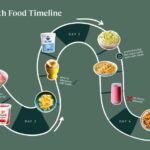Many dog owners wonder, “What Human Food Is Good For Dogs?” While commercially available dog food is formulated to meet their nutritional needs, certain human foods can be safe and even beneficial for our canine companions when given in moderation. This guide explores various human foods that are generally safe for dogs, along with essential precautions.
Safe Human Foods for Dogs: A Detailed Look
It’s crucial to remember that moderation is key when offering human food to dogs. Always consult your veterinarian if you have any concerns or specific dietary needs for your pet.
Vegetables: Nutritious and Crunchy Treats
Carrots: A fantastic, low-calorie snack, carrots are beneficial for a dog’s dental health. Chewing on raw carrots helps remove plaque and tartar, promoting good oral hygiene. They are also a great source of vitamin A, which supports a healthy immune system, skin, and coat. Consider offering whole carrots as a chewing aid or chopping them into smaller pieces for easier consumption.
Cucumbers: These are a safe, low-calorie snack option, especially for overweight dogs. Cucumbers are hydrating due to their high water content and provide essential vitamins and minerals, including vitamin K. Offer sliced cucumbers as a refreshing treat during warmer months.
Green Beans: Plain green beans, whether cooked or raw, are a healthy snack choice. They are a good source of protein, calcium, iron, and vitamin K. Chop them up to prevent choking. Veterinarians can advise on whether your pet needs extra fiber in addition to their regular diet.
Fruits: Sweet and Vitamin-Rich
Apples: A good source of vitamins A and C, and dietary fiber, apples can aid in regulating a dog’s digestion. However, avoid giving dogs rotten apples as they can lead to alcohol poisoning. Always remove the core and seeds before offering apple slices as a treat.
Blueberries: Packed with antioxidants, fiber, and phytochemicals, blueberries are a healthy addition to a dog’s diet. Antioxidants help reduce oxidative stress, lowering the risk of diseases and age-related issues. They can be served as a small, tasty snack or added to their regular food.
Bananas: These are a good source of magnesium, which is essential for bone health. Due to their high sugar content, bananas should only be given as an occasional treat. Slice them into small pieces for easy consumption.
Watermelon: This fruit is safe for dogs after removing all seeds, which can cause intestinal blockages. The rind can also cause stomach upset, so it’s best to avoid it. Watermelon’s high water content helps keep dogs hydrated and offers vitamins A, C, and B-6.
Grains & Starches: Easy to Digest Options
White Rice: Cooked, plain white rice is easily digestible and can be beneficial for dogs experiencing an upset stomach. It helps to bind stool. However, be mindful of portion sizes, as white rice can raise blood sugar levels. Dogs with diabetes should consume it in limited amounts.
Plain Popcorn: Air-popped popcorn without salt, butter, or sugar is a nutritional treat for dogs. It contains minerals like magnesium, phosphorus, and zinc, which are essential for their health. Ensure dogs do not eat unpopped kernels to prevent choking.
Proteins: Lean and Nutritious
Fish: Salmon, shrimp, and tuna are all safe for dogs and excellent sources of protein. Salmon and tuna are rich in omega-3 fatty acids, which promote a healthy immune system. Shrimp provides B vitamins, supporting the digestive system and healthy blood circulation. Always cook fish thoroughly to eliminate harmful parasites.
Chicken: Plain, boiled chicken without seasoning is a good option for dogs with an upset stomach. It’s easy to digest and provides a lean source of protein.
Pork: Unseasoned, cooked pork can be offered in small portions. However, its high-fat content can be hard for dogs to digest, potentially causing inflammation and pancreatitis. Avoid feeding bacon or processed ham due to their high salt content.
Turkey: Cooked turkey is a safe and protein-rich option. Many commercial dog foods contain turkey. Always remove the skin and fat before giving it to your dog to prevent pancreas issues.
Dairy & Other: Treats in Moderation
Dairy Products: Small quantities of dairy products like milk, cheese, and plain yogurt may be safe for dogs. However, excessive dairy can cause digestive problems due to low levels of lactase, the enzyme that breaks down sugars in milk. Dogs with lactose intolerance should avoid dairy altogether.
Peanut Butter: Unsalted peanut butter without added sugar or sweeteners is safe in moderation. It provides beneficial elements like vitamins E and B, niacin, healthy fats, and protein. Always check the label to ensure it doesn’t contain xylitol, which is highly toxic to dogs.
Coconut Products: Coconut oil and meat may offer several benefits, including reducing inflammation, boosting the immune system, and improving skin health. Some studies suggest coconut oil supplements may reduce seizures in dogs with idiopathic epilepsy. Consult with a veterinarian before incorporating coconut products into your dog’s diet.
Foods to Absolutely Avoid Feeding Your Dog
While many human foods are safe for dogs, some are toxic and must be avoided:
- Chocolate
- Grapes and raisins
- Onions and garlic
- Avocado
- Xylitol (artificial sweetener)
- Alcohol
- Raw dough
Conclusion: A Balanced Approach to Feeding Your Dog
“What human food is good for dogs?” The answer is that several options can be safe and beneficial when given in moderation. Always prioritize a balanced diet formulated for dogs and use human foods as occasional treats. When introducing new foods, start with small amounts and monitor your dog for any adverse reactions. Consulting your veterinarian is essential for personalized advice based on your dog’s specific health needs. By taking a cautious and informed approach, you can safely incorporate certain human foods into your dog’s diet, enriching their meals and promoting their overall well-being.
